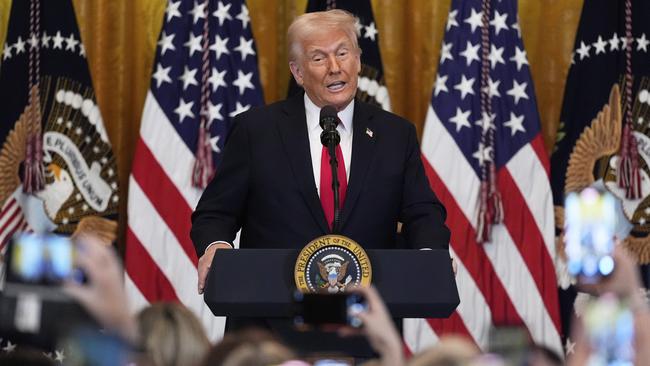Aussie farmers brace for US tariffs
US President Donald Trump’s ‘Liberation Day’ tariffs are expected to be announced at 7am tomorrow. Speculation is rife about the size of the potential tariffs, but little information has been forthcoming.
Almost $8.2bn worth of Australia’s agricultural exports to the United States could be subjected to tariffs come Thursday.
US President Donald Trump is expected to announce the latest round of “reciprocal” global tariffs at 7am on April 2 (AEST) that he is spruiking would deliver the US economy $US600bn a year.
While Australia has a longstanding trade surplus with the US, it is one of the top destinations for farm exports, and the largest buyer of Australian beef.
Last year more than $8bn worth of Australian farm produce was exported to the US, including a record $4.37bn worth of Australian beef and veal and $1.37bn worth of sheep meat.
Speculation is rife about the size of the potential tariffs, but little information has been forthcoming from the Trump administration, with the details set to be revealed in a “Liberation Day” ceremony President Trump is hosting in the famed White House Rose Garden.
The tariffs were initially planned for April 1 but given the timing with the annual day for practical jokes, April Fool’s Day, they were scheduled for April 2, and will take effect immediately.
Trade Minister Don Farrell met with businesses, farmers and industry groups yesterday to discuss a range of options the Trump administration may take.
Tariffs of 20 per cent are widely believed to be a likely option, but National Farmers’ Federation president David Jochinke said concrete details remained unknown.

On Tuesday the United States trade office published its annual Trade Barriers Report, which details any trading issues the US has with its exports spanning almost 400 pages.
Prime Minister Anthony Albanese promptly responded that the nation’s strict biosecurity protocols were “not up for negotiation”, despite being singled out as one of the White House’s main trading grievances with Australia.
Little more than two pages of the report are dedicated to hurdles the US has with Australia – largely due to the United States – Australia Free Trade Agreement signed in 2005 that provides duty-free access for all US exports – but most deal with Australia’s stringent biosecurity regimes restricting imports of fresh meat and fruit.
It lists Australia’s ban in 2003 on imports of fresh US beef following a detection of bovine spongiform encephalopathy, a similar ban on fresh pork due to disease fears, cooked poultry, and apples and pears as issues “of high priority”.
In response, Mr Albanese said he would defend Australia’s biosecurity laws, and that the issue was not up for negotiation.
“Biosecurity is the first line of defence against extinctions and ecological destruction caused by new invaders. It is cheap compared to mopping up the mess if we let these things arrive,” Mr Albanese said.
The publishing of the US Foreign Trade Barriers report has given the world a glimpse of which countries and what commodities will be targeted for retaliatory US tariffs.
AMP deputy senior economist Diana Mousina said Australia fared much better than most other countries in the report, with just two pages of “barriers” compared to 34 pages dedicated to the European Union, despite being its largest trading partner.
“What the US is trying to do with this report is highlight where its largest trade deficits are, and it runs a trade surplus with Australia, and because of the free trade agreement it can’t call us out for unfair treatment,” Ms Mousina said.
“We shouldn’t be worried Australia is going to be hit with massive tariffs, that’s a very exaggerated view. (But) if you’re a specific exporter heavily reliant on the US, then of course its not nothing to them, but there are other export markets to offset a loss of the US market.”
But the peak body for red meat exports has called for calm ahead of any new US tariffs.
Red Meat Advisory Council chair John McKillop said the industry was well-equipped to respond to any export market access changes.
Australian Meat Industry Council chief executive Tim Ryan said while the US was a highly valued trading partner, demand for Australian red meat remained strong globally.
“The global demand for high-quality Australian red meat continues to grow, and our supply chain is well-positioned to respond to shifts in the international trade landscape. The past five years have been a case study in how Australian exporters have demonstrated their ability to manage risk and navigate change to world trade, security and consumer habits,” Mr Ryan said.





